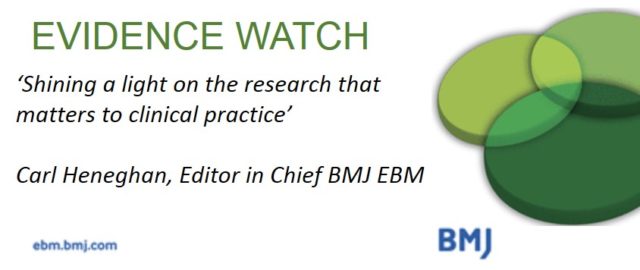Gender dysphoria occurs when a person experiences discomfort or distress because of a mismatch between their biological sex and gender identity. Gender dysphoria can arise in childhood and adolescent which raises many questions about how best to handle the condition. This post sets out some of the current evidence for gender-affirming hormones in adolescents […]
Category: Evidence Watch

TVT: seventeen year follow up and the shrinking denominator effect
The shrinking denominator enhances the effect size and misleads the reader into thinking the effect is better than it actually is. Carl Heneghan I am at the Ideal Conference, at a workshop talking about clinical trial reporting and recent surgical scandals. I chose the 17 years follow-up of the Tension-free Vaginal Tape – often quoted – […]
First do no harm: surgical mesh
Last week, I learnt with great sadness of the death of Eileen Baxter, who died in an Edinburgh hospital in August. Mrs Baxter’s cause of death was multiple organ failure. Sacrocolpopexy mesh repair is named as an underlying cause on her death certificate, meaning the mesh triggered the chain of events leading to her […]
Bronchial Thermoplasty – evidence does not back up NICE approval
We’ve been here before with devices, the studies are small, biased, there is lots of uncertainty about who, if anyone, benefits from this treatment and the adverse events including admissions are higher. Carl Heneghan Bronchial Thermoplasty is all over the news today: The BBC reports that the New asthma treatment is set for wider […]
Do Calcium and Vitamin D supplements cause cancer?
In a recent trial calcium and vitamin D treatment elevated the risk of precancerous polyps nearly fourfold – but does this result matter? Carl Heneghan If you weren’t observing carefully, you likely missed this study, I did. A recent randomised trial participants with one or more adenomas received daily calcium, vitamin D3, both or […]
UK bans transvaginal mesh: here’s 5 reasons why
The problems with transvaginal mesh are longstanding and have gone on far too long Carl Heneghan This week the UK put a temporary ban on surgical mesh for stress urinary incontinence. Julia Cumberlege, who chaired the review, said: “I have been appalled at the seriousness and scale of the tragic stories we have […]
NHS Health Check appears neither equitable nor cost-effective
NHS health checks may be missing the point when it comes to offering the optimal interventions and preventing cardiovascular disease. Carl Heneghan Since 2009 the NHS Health Check programme in England has added considerably to GP workload and has proved to be controversial given the uncertainty about whether it adds value. A Cochrane review found […]
Paracetamol for patent ductus arteriosus
A recent review suggests paracetamol may be as effective as ibuprofen for the closure of patent ductus arteriosus. But there is much more to come with 19 more trials due to report. Carl Heneghan In preterm newborns, the mainstay of treatment for patent ductus arteriosus have been ibuprofen or surgery; however, case reports have […]
NOACs: good for some perhaps, but not for all
‘More than ten years of use, there remains uncertainty as to which populations are most likely to benefit from NOACs.’ Kamal Mahtani Over the last ten years, prescribing of non-vitamin K oral anticoagulants (NOACs) has increased substantially. In the UK, an estimated 58% increase has been quoted with a nine-fold increase in anticoagulant costs. […]
Should you treat resolved Atrial Fibrillation?
Do patients with resolved AF have a higher risk of strokes, asks Jack O’Sullivan Patients with Atrial Fibrillation (AF) are five times more likely to have a stroke than patients without AF. AF can be reversed (sinus rhythm restored) via catheter ablation or cardioversion (either electrical or chemical). Patients can also spontaneously revert to sinus […]